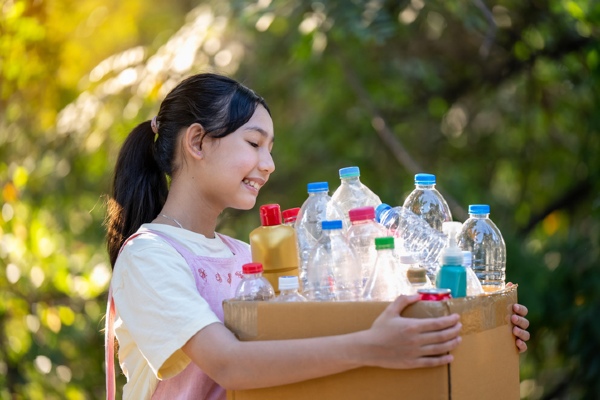
California Looks to Cut Plastics, Landfill Waste With New Recycling Laws
Many Americans put their plastic trash in recycling bins based on the “chasing arrows” symbol stamped on the bottom of the packaging. However, only about 5% to 6% of plastics are recycled in the U.S. Plastics are made of thousands of different chemicals to give them specific properties, and only a few can be recycled together. The rest wind up in landfills and marine environments.
California has passed tough new recycling laws aimed at reducing the amount of plastic waste that goes into landfills. Senate Bill (SB) 343 prohibits producers from using the recyclable symbol and Resin Identification Code (RIC) unless the packaging meets certain criteria. It also requires the California Department of Resources, Recycling, and Recovery (CalRecycle) to study the rates at which various materials are recycled.
SB 54 is designed to reduce the amount of plastic packaging and single-use plastics and ensure that non-reusable plastics can be recycled or composted. Producers must also take steps to minimize negative effects on the environment and public health, particularly in disadvantaged communities most harmed by plastic waste.
The Plastics Recycling Challenge
Most plastics can be recycled to a certain extent. However, sorting out the various types and melting them down is more expensive than making new products. In addition, plastic cannot be recycled more than once or twice because it degrades each time.
Documents show that the plastics industry has known about these limitations since at least the 1970s. Yet in the 1990s, the industry spent millions on ads promoting the recyclability of plastics to consumers who were increasingly concerned about the environment. These ads, coupled with the recyclable symbol, led consumers to believe that plastics can be recycled. Recycling plants receive mountains of plastic waste they can’t process, which costs more than disposing of the material in the garbage.
Restrictions on Recyclability Claims
SB 343 addresses this issue. It amends the California Public Resources Code to include Section 42355.51, “deceptive or misleading claims about recyclability of product or packaging.” A producer can only claim that a product is recyclable if it’s collected by local recycling programs that cover at least 60% of California’s population. The product must also be sorted into high-volume “streams” by facilities serving at least 60% of the state’s recycling programs.
A product with a “demonstrated recycling rate” of at least 75% is considered recyclable regardless of whether it meets the other two criteria. This means at least 75% of the product that’s collected and sorted in the state “is reprocessed into new products or packaging.”
Under SB 343, use of the recyclable symbol and RIC constitutes a recyclability claim. Thus, only products that meet the law’s requirements can use the RIC and chasing arrows. This could conflict with other state laws that require the symbol and RIC on certain materials.
Reducing the Amount of Single-Use Plastics
SB 54 establishes an Extended Producer Responsibility (EPR) program, requiring producers to shoulder some of the burden of managing single-use plastic waste. Most EPR laws focus on improving “recovery rates” of single-use plastics — the quantity of material that’s collected, sorted, and aggregated. SB 54 goes further, requiring “source reduction” of plastic material and progressively increasing recycling rates.
By January 1, 2032, all material must be potentially recyclable or compostable, and at least 65% of the material must actually be recycled. Producers must pay a fee to support these programs and join the nonprofit Producer Responsibility Organization by January 1, 2027. Those that fail to do so will be banned from selling materials in California.
The law acknowledges that “disadvantaged and low-income communities are disproportionately impacted by the human health and environmental impacts of plastic pollution and fossil fuel extraction.” It requires that stakeholders avoid or minimize these impacts when meeting SB 54’s requirements and allocates funds to benefit residents of these communities directly.
Far-Reaching Implications
SB 54 was passed in response to the California Plastic Waste Reduction Regulations Initiative, which was slated to appear on the ballot in November 2022. Sponsors withdrew the initiative after Gov. Gavin Newsom signed SB 54.
The plastics industry and associated trade groups negotiated with California legislators in the drafting of SB 43. While the industry faces tough new standards, the law is less onerous than the ballot initiative, which would have imposed stricter requirements on producers with a shorter implementation timeline.
California’s tough new recycling laws aim to reduce the amount of plastic waste that goes into landfills. The laws also require dramatic reductions in the amount of plastic packaging and single-use plastics by 2032. Much of the onus is on producers to ensure that plastics can be easily reused or recycled. Because California is the world’s fifth-largest economy and America’s most populous state, these regulations are expected to have far-reaching implications for businesses that produce plastics.
Learn More About New Developments in Law
Stay up to date on the most current legal developments in California and the rest of the nation with Purdue Global Law School.
Purdue Global Law School offers an online Juris Doctor if you wish to become an attorney licensed in California. If you wish to advance your legal education but do not intend to become a practicing attorney, you may consider an online Executive Juris Doctor.
Single law courses are also available to help you explore a particular area of law without committing to a full degree program. Request more information today.

